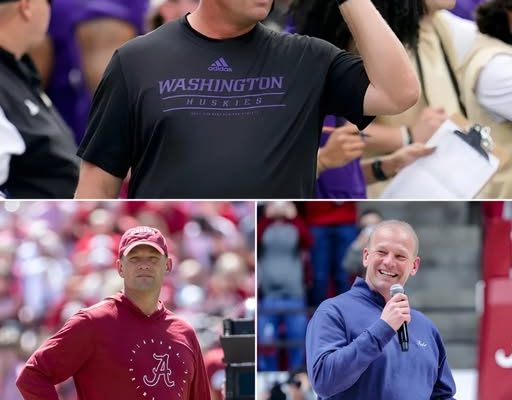Alabama Crimson Tide fans are no strangers to passion and intensity, but one devoted supporter recently took fandom to a level few could have predicted. Susie Conerly, a resident of Guntersville, Alabama, made headlines this weekend when she publicly vowed to use her hypothetical Powerball winnings to buy out the contract of head coach Kalen DeBoer, whose deal reportedly carries a buyout clause of around $70 million. The clip, which has since gone viral on social media, shows Conerly speaking with WHNT News 19 outside a local gas station where she purchased her tickets ahead of Saturday’s drawing. Her message was clear: if fortune smiled upon her, she would spare no expense in reshaping the leadership of her beloved Crimson Tide.
Conerly’s comments underscore the heightened emotions surrounding Alabama football in 2025. The Tide, perennial powerhouses in the college football world, had just suffered a stunning 31-17 season-opening loss to Florida State, a result that sent shockwaves through the fanbase. For a program accustomed to dominance under legendary coach Nick Saban, the transition to Kalen DeBoer’s leadership has not been entirely smooth. DeBoer, who succeeded Saban in 2024, had already experienced setbacks against unranked opponents, and this latest defeat only fueled scrutiny of his methods and leadership. Conerly, like many fans, expressed frustration at the perceived underperformance of a team accustomed to excellence. Her decision to link her hypothetical lottery winnings to DeBoer’s ouster is perhaps an extreme reflection of the high stakes and high emotions tied to Crimson Tide football.
In her interview, Conerly laid out her plans without hesitation. “I’ll tell you exactly what I’d do with the first $70 million,” she declared. “I’d pay off Kalen DeBoer and get him the heck out of the University of Alabama. And then I’d take whatever else it took to get rid of the AD [Greg Byrne].” The specificity of her target indicates a thorough understanding of Alabama football’s internal hierarchy. Greg Byrne, the athletic director, has overseen Alabama’s athletic programs with considerable influence, and Conerly’s remarks reflect a belief that the responsibility for the team’s early-season struggles extends beyond just the head coach. While many fans might express disappointment or call for coaching changes online, Conerly’s hypothetical commitment to leveraging a multi-billion-dollar fortune highlights both her passion for the program and a dramatic flair for problem-solving.
This isn’t the first time that Alabama fans have made headlines for their extreme devotion to the program. Crimson Tide football has a legacy of producing die-hard supporters who treat the team’s fortunes with the intensity of personal investment. Yet Conerly’s statements stand out not just because of their boldness, but because of the scale she invoked: nearly $2 billion in Powerball winnings, with $70 million earmarked solely to settle DeBoer’s contract. The idea of a fan directly paying a coach’s buyout is almost unprecedented in modern college sports. While booster contributions, donations, and ticket revenues indirectly influence team operations, Conerly’s public willingness to take personal financial action—albeit hypothetical—is a remarkable illustration of fandom reaching its most extreme form.
The timing of her remarks also amplifies their impact. Alabama’s opening loss to Florida State has already sparked a national conversation about the program’s trajectory under DeBoer. Analysts and commentators have debated the factors contributing to the defeat, from strategic missteps to player execution issues. The Crimson Tide have long been measured against the benchmark set by Nick Saban, whose tenure brought multiple national championships and a sustained culture of winning. DeBoer entered with high expectations and a pedigree of success, but any transition period in a storied program is rarely without turbulence. Fans, eager to see immediate results, often react with impatience, and Conerly’s hypothetical lottery intervention captures the tension between expectation and reality.
Beyond the immediate drama, Conerly’s comments reveal the broader cultural significance of college football in Alabama. For many fans, the sport is not merely a pastime; it is a central thread in community identity, local pride, and social life. The notion of using a staggering financial windfall to directly influence team leadership, while extreme, underscores the emotional weight attached to the program. Fans see themselves as stakeholders, invested not just emotionally but ideologically in the continued dominance of Alabama football. Conerly’s willingness to envision a world in which she can directly enact change reflects the deep personal connection that fans feel with the team, a connection that transcends conventional modes of influence.
The reaction to Conerly’s remarks has been immediate and polarized. Social media platforms lit up with both support and skepticism. Some users lauded her creativity and dedication, viewing her hypothetical plan as a humorous yet passionate expression of fan loyalty. Others criticized the approach as over-the-top or impractical, noting that actual buyouts involve contractual obligations, legal procedures, and institutional governance that a single fan—even one with billions—cannot realistically circumvent. Yet even among skeptics, there is acknowledgment that the fervor of Crimson Tide supporters continues to be unmatched in the college football landscape.
Financially, the scenario Conerly outlined is staggering. A $70 million buyout, while not unusual for top-tier coaching contracts in college football, represents an enormous expenditure in the context of individual spending. Adding the hypothetical context of nearly $2 billion in lottery winnings elevates the discussion from practical to fantastical. Lottery jackpots of this magnitude capture public imagination, and Conerly’s willingness to attach a specific, concrete goal to her potential windfall gives a narrative structure to what is often an abstract dream of sudden wealth. Her focus on the coach’s buyout is particularly telling, suggesting a strategic understanding of how contracts operate within the athletic world and the leverage that financial resources can provide in reshaping leadership.
From a broader perspective, Conerly’s remarks also highlight the intense scrutiny faced by coaches in high-profile programs. College football coaching is a high-pressure, high-visibility profession, where a single loss can invite national debate and fan outrage. DeBoer’s tenure, though still in its early stages, is being evaluated against the towering legacy of his predecessor. While many fans accept transitional challenges and growing pains, the passionate Alabama fanbase has little tolerance for perceived mediocrity. Conerly’s vow to hypothetically use her fortune as a corrective measure embodies this climate of expectation and underscores the reality that coaching in a program like Alabama carries consequences that ripple far beyond the field.
The Crimson Tide’s upcoming schedule further intensifies scrutiny. With the team standing at 0-1 and ranked No. 21, every subsequent game becomes an opportunity to restore confidence and prove resilience. Opponents like Louisiana-Monroe offer a chance for the team to regain momentum, but they also serve as a litmus test for DeBoer’s capacity to respond under pressure. Fans like Conerly are acutely aware that early-season setbacks can have outsized influence on perception, recruiting, and morale. Her comments, while extreme, reflect a fan perspective that places winning and program stability above all else. The hypothetical use of personal wealth to influence coaching decisions, in this context, becomes a symbol of the stakes involved for those deeply invested in the team’s success.
The social media virality of Conerly’s clip is another dimension worth considering. In an era where content spreads instantly and opinions amplify rapidly, individual voices like hers can quickly become national talking points. Clips such as hers are shared, commented on, and analyzed not merely for their humor or audacity but for what they reveal about the emotional investment of college football fans. The interplay of wealth, sports loyalty, and public discourse creates a perfect storm for viral engagement. Conerly’s hypothetical Powerball scenario becomes more than a personal declaration; it becomes a conversation starter about fandom, influence, and the lengths to which supporters might dream of going to protect or enhance the programs they love.
While her plan remains firmly in the realm of imagination, Conerly’s statements also spark reflection on the larger structural realities of college athletics. Coaching contracts, buyout clauses, and athletic department oversight create a framework in which individual fans’ influence is largely symbolic. Yet this symbolic influence carries weight in shaping culture, expectations, and community engagement. Fans like Conerly embody the passion and commitment that drive ticket sales, donations, merchandise revenue, and broader public interest. Even without an actual Powerball windfall, her words remind institutions that supporters are not passive observers; they are active participants in the narrative of the program.
The juxtaposition of fantasy and reality in Conerly’s comments is striking. On one hand, the notion of using billions to buy out a coach is fantastical, almost cartoonish in scale. On the other, it serves as a metaphor for the level of accountability fans demand from leadership and the investment—emotional, social, and financial—they are willing to make to see the program thrive. This blending of imagination with serious critique makes her statements both entertaining and meaningful. It’s a reminder that college football, particularly at a program as iconic as Alabama, operates at the intersection of sport, culture, and community identity.
In conclusion, Susie Conerly’s viral declaration offers a fascinating glimpse into the fervent world of Alabama Crimson Tide fandom. Her hypothetical plan to use nearly $2 billion in Powerball winnings to buy out Kalen DeBoer’s contract is audacious, imaginative, and emblematic of the emotional stakes that define college football. It underscores the pressures faced by coaches, the expectations of fans, and the extraordinary passion that surrounds programs like Alabama. Whether viewed as a humorous exaggeration or a serious statement of intent, her comments have captured national attention and sparked conversations that extend beyond the field. As the Crimson Tide navigates the challenges of the 2025 season, fans like Conerly will continue to serve as a vivid reminder that in Alabama, football is more than a game—it is a deeply held part of life, identity, and community, capable of inspiring dreams as wild and audacious as a Powerball windfall.



